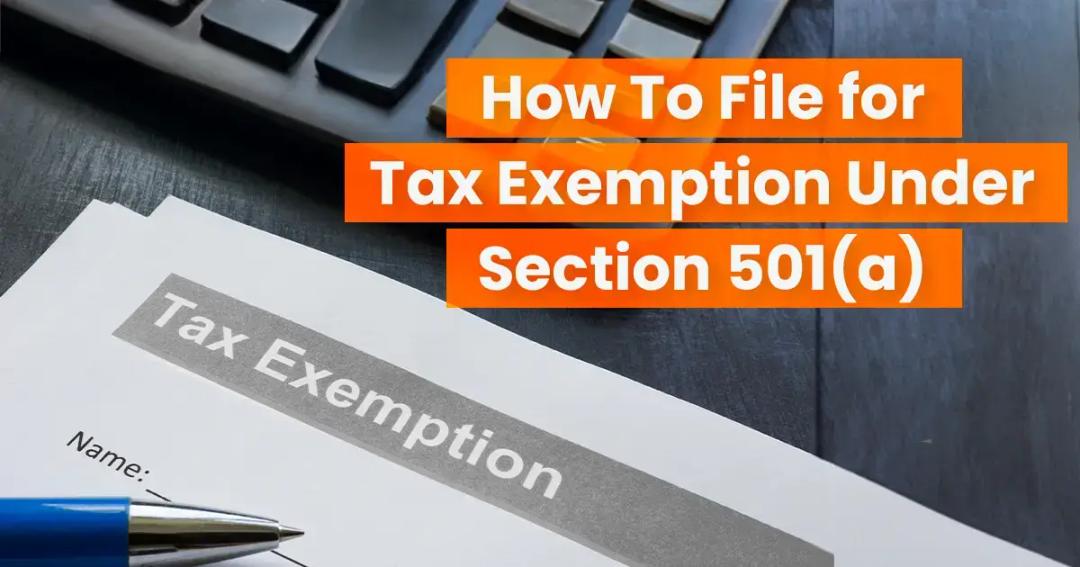
Within the intricate realm of taxation, this article aims to shed light on the process of attaining tax-exempt status for nonprofit organizations and charitable entities. In this informative guide, we will navigate the complexities of tax exemption, offering valuable insights and step-by-step instructions to assist you in pursuing tax relief.
Section 501(a) and Tax Exemption: An Overview
Let's start by understanding Section 501(a) and the concept of tax exemption. Under Section 501(a), certain entities can be recognized as exempt from federal income tax.
The Internal Revenue Service (IRS) distinguishes several types of tax-exempt entities. These can include private foundations, public charities, social welfare organizations, and more. Each qualifying organization serves diverse purposes, from advancing education and relieving poverty to promoting social welfare and supporting charitable causes.
How to File a 501 Tax Exempt Form
Now that you grasp the essence of tax exemption, it's time to delve into filing for a 501 tax exempt form. This crucial document, officially known as Form 1023 or Form 1023-EZ, sets the wheels in motion for your nonprofit organization or charitable entity to secure that coveted tax-exempt status. To be exempt from tax under Section 501 a, here are the steps you should take:
1. Determine Eligibility
Before beginning the process, ensure that you have a qualifying organization that meets the criteria for tax exemption. Generally, organizations falling under Section 501(c) of the Internal Revenue Code are eligible. This includes nonprofit organizations, religious entities, educational institutions, and more. However, remember that certain political organizations and private foundations may face additional requirements.
2. Choose the Right Form
Once eligibility is confirmed, you must select the appropriate form for your application. The two primary options are Form 1023 and Form 1023-EZ. Form 1023 is more detailed and comprehensive, suited for larger tax-exempt entities. Form 1023-EZ is a streamlined version designed for smaller, less complex entities.
3. Prepare the Necessary Documents
Gather the documents required to support your application. These include your organization's articles of incorporation, bylaws, financial statements, a narrative description of your activities, and more. Ensure that your paperwork is complete and compelling, as it lays the foundation for a successful application.
4. Fill Out the Form with Finesse
Pay careful attention to every question, responding truthfully and accurately. Provide clear, concise explanations for your organization's mission, activities, and financial details. Remember, precision and clarity are your allies in this quest.
5. Submit and Await the Verdict
With your form completed, it's time to submit your application. Along with the form, enclose any required fees, as specified in the instructions. Now comes the waiting game. The IRS will carefully review your application, conducting due diligence to ensure your organization complies with the requirements for tax exemption.
Important Things to Keep in Mind
As you embark on the tax exemption process, keep a few essential points in mind:
- Compliance is Key – Maintaining tax-exempt status requires ongoing compliance with IRS regulations. Stay informed about your obligations, such as filing annual information returns (Form 990) and adhering to specific restrictions on political activities and unrelated business income.
- Stay Up-to-Date with Changes – Tax laws are ever-evolving beasts. Keep a vigilant eye on updates and amendments to the tax code, ensuring that your tax-exempt organization remains in harmony with the latest requirements. The IRS website and publications, such as IRS Publication 557, will guide you on this ever-changing path.
- Utilize the Power of Contributions – Remember that tax exemption not only benefits your organization but also encourages others to contribute to your cause. Individuals and businesses are more likely to donate to a tax-exempt organization, as their contributions may be tax-deductible. Embrace the power of charitable contributions to fuel your mission.
Work with the Experts
1-800Accountant is a virtual accounting firm merging the convenience of technology with live support from real professionals, making taxes easy and personable for individuals and small businesses. Focus on growing your bottom line while our team of accountants, certified public accountants, and enrolled agents perform the heavy lifting – tax advisory and preparation, payroll, bookkeeping, and audit defense. For professional, year-round services at an affordable price, get in touch with our nonprofit tax experts and schedule your consultation with America’s leading small business accounting firm.
This post is to be used for informational purposes only and does not constitute legal, business, or tax advice. Each person should consult his or her own attorney, business advisor, or tax advisor with respect to matters referenced in this post. 1-800Accountant assumes no liability for actions taken in reliance upon the information contained herein.
